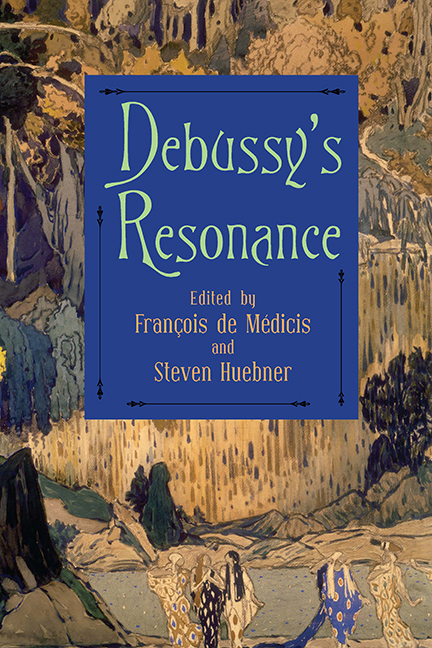Book contents
- Frontmatter
- Contents
- List of Illustrations
- Acknowledgments
- List of Abbreviations
- Introduction
- Part One Historiographical and Editorial Issues
- Part Two Style and Genre
- Part Three History and Hermeneutics
- Part Four Theoretical Issues
- Part Five Performance and Reception
- 18 Debussy and Late-Romantic Performing Practices: The Piano Rolls of 1912
- 19 Marius-François Gaillard's Debussy: Controversies and Pianistic Legacy
- 20 Fashioning Early Debussy in Interwar France
- List of Contributors
- Index
20 - Fashioning Early Debussy in Interwar France
from Part Five - Performance and Reception
Published online by Cambridge University Press: 27 July 2019
- Frontmatter
- Contents
- List of Illustrations
- Acknowledgments
- List of Abbreviations
- Introduction
- Part One Historiographical and Editorial Issues
- Part Two Style and Genre
- Part Three History and Hermeneutics
- Part Four Theoretical Issues
- Part Five Performance and Reception
- 18 Debussy and Late-Romantic Performing Practices: The Piano Rolls of 1912
- 19 Marius-François Gaillard's Debussy: Controversies and Pianistic Legacy
- 20 Fashioning Early Debussy in Interwar France
- List of Contributors
- Index
Summary
In the years immediately following Debussy's death in 1918 initial assessments of his significance as a composer tended to concentrate on his middle-period works, which seemed to represent him at his most characteristic. At this early stage, there was some agreement that Debussy's reputation had been shaped by his most memorable and characteristic repertoire, from Prélude à l'après-midi d'un faune to the second book of piano preludes. The late works still remained to be fully understood beyond their association with the anguish and struggle of a dying patriotic composer (as Marianne Wheeldon and others have shown), and relatively little was known about Debussy's early works and career. Henry Prunières, the director of La revue musicale, addressed this neglect by devoting a second special issue of his journal to “La jeunesse de Claude Debussy” in 1926, which consisted of extracts from his letters to Henri Vasnier, unpublished early songs, numerous testimonies of those who knew him in his youth and early career, such as Gabriel Pierné, Robert Godet, and Maurice Emmanuel, as well as a study by Charles Koechlin of Debussy's unpublished early songs. The volume provided new insights into a hitherto unexplored and undocumented part of Debussy's career. Prunières took the opportunity to publish four early songs in the musical supplement of the special issue, which initiated debates about their intrinsic value and the extent to which they shed light on Debussy's early style. At stake was what image of Debussy should be remembered, recorded, and published for posterity. There was reluctance on the part of his former colleagues, wife, critics, and biographers to portray a less than perfect side of his genius. At the same time, there was an overreliance on testimony and the presentation of personal documents, including the Vasnier letters, which subsequent research has shown to have been incorrectly ordered and dated. The posthumous documents relating to early Debussy informed subsequent biographies and critical studies of the composer, starting with the Koechlin (1927) and Léon Vallas biographies (1926, 1932, and 1944). In this essay, I tease out the significance of the first attempts to reconstruct and scrutinize the early musical life and work of their near contemporary Debussy. In so doing, I build on the recent scholarly work devoted to Debussy's early compositions by Marie Rolf, Denis Herlin, Richard Langham Smith, James Briscoe, John Clevenger, and many others.
- Type
- Chapter
- Information
- Debussy's Resonance , pp. 581 - 602Publisher: Boydell & BrewerPrint publication year: 2018



